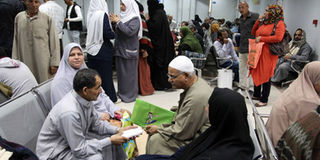Egypt’s journey to victory over hepatitis C

Patients waiting to get treatment for Hepatitis C in a medical center in Mahalla. Photo by Mohamed Elsaeed - Almasry Alyoum
“We used to take a family photo each year because we worried one of us would die from hepatitis C, which had already killed six of us. So when the long-awaited treatment became available, we were over the moon,” says Ibrahim Nabih, 46, who lives in a village in the Egyptian Nile Delta.
His story is not unique, it is one of millions of “small miracles” achieved in the last few years after Egypt successfully implemented a massive campaign to detect and treat hepatitis C. In 2016, the disease killed roughly 40,000 Egyptians and nearly five million others were infected according to the World Bank.
The road to controlling hepatitis C in Egypt has required years of government effort, supported by international institutions such as the World Health Organisation (WHO), as well as local civil society organisations. Now the pioneering scheme to provide free treatment to Egyptian nationals and foreign residents has become an inspirational model for the rest of the world.
Awareness
The journey began in 2006 when Egypt founded the National Committee for Control of Viral Hepatitis (NCCVH). Dr Manal Hamdy El Sayed, a member of the NCCVH and a consultant to WHO, said that the committee’s goal was to provide treatment, but also to raise awareness of the disease and ways of preventing it. She attributes the plan’s success to political leadership and a highly experienced working group that includes the NCCVH, executives, information network managers, doctors, nurses, pharmacists, data entry personnel, volunteers, media and civil society.
In 2011, an integrated plan was put in place for diagnosis, prevention and cure. The number of treatment centres was increased to 26, so that there is always one within 50 km of a patient’s home. The treatment centres have provided their services continuously for the last 13 years without a single day’s closure, even during the revolution of 25 January 2011.
Formerly, patients were treated with the drug interferon, which had a success rate of only 50 per cent and unpleasant side effects. In 2014, the Egyptian government signed an agreement to procure the American medicine Sovaldi (Brand name of Sofosbuvir). The drug would cost one per cent of its international price as long as the Egyptian government bore the cost of treating patients for free and local companies manufactured a generic version in Egypt. Studies show that the locally manufactured drug – the cheapest in the world – is no less effective than the imported one.
Dr Wahid Doss, the president of the NCCVH, noted, “The previous Minister of Health, Dr Adel Adawy, made great efforts to reduce the price of the medicine so that it now only costs EGP 800 (USD 46) (about Shs170,000) for a course of treatment.” He said the pilot scheme’s success is due in large part to the size of the problem and the spread of the virus in Egypt, which led to popular pressure on decision-makers to quickly find a solution. Political leaders and successive health ministers have supported the NCCVH, which is fully independent and staffed by volunteers.
At the end of 2018, the government initiated its largest ever health-screening campaign for hepatitis C and non-communicable diseases. Over 52 million Egyptians were screened in medical centres and in mobile units at workplaces and in the streets.
Free treatment
In the last five years, the new medicines have cured around 3 million Egyptian citizens of hepatitis C. Dr. Gamal Esmat, a member of the NCCVH, said that 2018 is considered to be the year when hepatitis C was nearly eliminated in Egypt. He added, “This was the first time anywhere in the world that this number of people were treated in such a short time. In addition, a five year plan was put in place to prevent the spread of the disease.”
As treatment has been offered to almost all Egyptians who need it, in 2019 President Abdul Fattah al-Sisi ordered the government to extend the screening and provision of free treatment to include seven million refugees and foreign residents in Egypt. As part of its current presidency of the African Union, Egypt is also providing hepatitis C screening and treatment to one million people in over 14 African countries. Last April, an Egyptian delegation visited treatment centres in Somalia, Chad, Ethiopia and Sudan.
Whilst Egypt continues to be very successful at treating hepatitis C sufferers, experts agree that the biggest upcoming challenge will be to increase levels of prevention of the disease so as to preserve what has already been achieved. This will be through combatting bad practices in dealing with blood and improving procedures for preventing infection in hospitals.
This article is being published as part of 7.7 Billion, an international and collaborative initiative gathering 15 news media outlets from around the world to focus on solutions for social, economic and civic inclusion.




